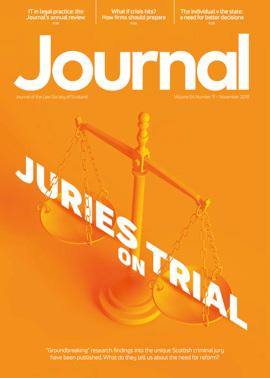The sword of truth: trusty or rusty?

Lawyers must always tell clients the truth. Incontrovertible, you may think. The regulator certainly does. Yet experience shows that though we agree in principle, we do not always follow through in practice. Specifically, we do not like to give our clients bad news, still less having to admit a mistake.
Bad news is part of life. Every lawyer should learn how to break it. There is an old account, I hope apocryphal, of how police were taught, using the following scenario, to break the news to a woman that her partner had died.
“Good morning madam, does the widow Brown live here?”
“I’m Mrs Brown, but I’m not a widow.”
“You are now, dear. By the way, do you have a licence for that dog?”
Doubtless, things are now done a tad more sensitively.
Good practice for bad news
There are rules about breaking bad news well.
First, be straight. Use moderate, empathetic language, showing you acknowledge the impact on the client, and are sympathetic. But do not try to sugar-coat the reality. That may seem like a kindness, but it’s actually the opposite. Your first priority is to help your client make the best decision in the circumstances, an impossible task without a proper grasp of the facts.
Secondly, be ready to give your client a clear picture of the number and extent of risks they face.
Thirdly, and most importantly, be ready to give equally clear, concise advice on what you consider to be the best solution. Do not hide behind, “This is a matter/commercial decision for you.” Ultimately, it may be, but it is a dereliction of our professional duty not to offer our considered, expert view on the available options. What else are clients paying for?
Finally, get to the point quickly. Bad news is never improved by an elaborate tiptoe through the tulips before it is delivered.
The cost of concealment
What if we are an element in the bad news? For example, what if a matter develops in a way we did not anticipate, and is now going to cost more than originally estimated? Lawyers often tie themselves in knots over this. Some chicken out, being prepared to lose perhaps thousands of pounds rather than incur the client’s wrath. Some stop recording time, to conceal these losses. Some hide the reality from their client until the end, and then hit them with a bill several times larger than they were expecting. Clients may not be overjoyed to hear that costs have escalated, but if you explain openly and at the earliest possible moment how and why this happened, most of the time they will not blame you.
By all means soften the blow by allowing some discount if you’re able, or extra time to pay, or both. Emphasise that you understand the news is unwelcome, and that you do see it from their point of view. Reiterate your commitment to keeping costs as low as possible, consistent with doing the job properly.
The conversation will be easier and more confidently conducted if you have provided for the possibility of increase in the original scope and terms of engagement, so that clients are aware from the outset that nothing is set in cement.
The quality of mercy…
Mistakes are also part of life. Tragic cases abound of good people being drummed out of the profession because of their inability to admit a mistake.As in many other aspects of life, the cover-up proves more deadly than the crime. Early in my career, one of my former university classmates forgot to obtain a client’s signature and, in a moment of madness, forged it.
There was zero personal benefit to him. He was struck off. The tribunal may have had no option, but what a waste of what would have been a fine career.
Until humans cease to practise law, mistakes will be with us. Managing them well is one of law firm leaders’ most important tasks. There are many tools: technology, systems, training, supervision regimes, and ultimately insurance. But one of the most powerful is cultural, and not all use it. Effective leaders will not just convey to their teams, but mean it, that: everyone is prone to error, not least them; nobody will be punished for an honest mistake, provided they alert the firm as soon as it comes to light; the firm will always rally round to fix the problem, and learn from it; but, on the other hand, woe betide anyone who attempts a cover-up.
“I want to do the right thing, and also enjoy myself on the pitch,” said Chelsea footballer, Victor Moses. Expressed slightly differently, “I enjoy myself on the pitch because I do the right thing” feels like a universal principle.






